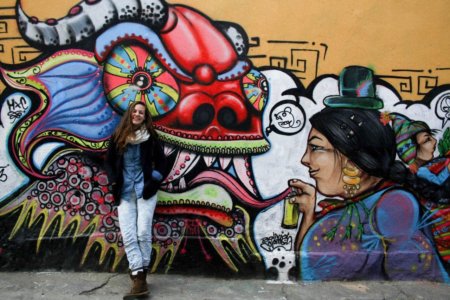IDS Grads Changing the World: Megan Hancock (BA’12)
By Jessica Hirtle
For Megan Hancock (BA’12) strong intercultural communication skills are a must. She tells us how she formed these skills through IDS experience, including participating in the Cuba program.
 Over the past four years, Meagan Hancock has been putting her knowledge and skills to work in La Paz, Bolivia, to contribute to local development efforts.
Over the past four years, Meagan Hancock has been putting her knowledge and skills to work in La Paz, Bolivia, to contribute to local development efforts.
Since January 2017, Hancock has been working as a communications advisor with La Paz Maravillosa, one of the Centre for International Studies and Cooperation’s (CECI) partners in Bolivia. La Paz Maravillosa’s mission is to enhance the experience of tourists who visit La Paz. Hancock’s role aims to improve the organization’s communications practices, and reinforce its role in promoting tourism in Bolivia.
I think it is important to have an abroad experience while you’re doing your studies…To figure out [if you] can actually do this or not. That was really useful.
This partnership was established through Uniterra, a leading Canadian international development program that is jointly operated by CECI and World University Service of Canada (WUSC). Through the program, Each year hundreds of Canadians contribute their time and experience to positive and lasting change towards a more equitable world.
An International Development Studies graduate (BA 2012), Hancock had a solid academic background that enabled her to understand the systemic issues faced by the Bolivian population.
But nowadays it’s not enough to just have an IDS degree. You really have to have good, concrete skills that go along with that.
During her time at Dalhousie, Hancock also participated in the Cuba program. She says that through the Cuba program she acquired intercultural communication skills that now help her navigate through cultural struggles, which all can be applied to her daily life.
“I think it is important to have an abroad experience while you’re doing your studies,” says Hancock. “To figure out [if you] can actually do this or not. That was really useful.”
“But nowadays it’s not enough to just have an IDS degree,” says Hancock. “You really have to have good, concrete skills that go along with that.”
During her mandate, Hancock has used many skills she did not learn in school but developed on the side. Her position includes a wide variety of responsibilities: translation work, promoting tourism and local artisans, website development and photography. She maintains an active blog of her photography in Bolivia .
Being able to empower women economically is a really big step in developing the well-being of women, but also the society as a whole.
An important part of her role in Bolivia consists in transferring her skills to La Paz Maravillosa and their network. For Hancock, the most rewarding part of her job is working with the artisans to help promote their products.
“I can transfer the skill to them and then they can do it on their own,” says Hancock. “It’s really inspiring to see them get the knack of it.”
In Bolivia, Hancock says she is most passionate about gender equality, which, she says, can then facilitate economic equality. “Being able to empower women economically is a really big step in developing the well-being of women, but also the society as a whole,” says Hancock.
Originally from Halifax, Nova Scotia, Hancock chose to attend Dalhousie University not only for its proximity, but also for the International Development Studies program.
“I loved my time at Dal so much,” says Hancock. “I had a really great experience.”
In addition, Hancock says she most enjoyed listening to the stories of the IDS professors about their travels, studies and work abroad.
“The things that they were teaching you are things that they have personal experience in,” says Hancock.
Determine and develop skills that can be utilized in the field
Her two takeaways from these stories: the possible cultural differences you might encounter in the field and how these differences and personal perceptions could impact work abroad.
“That’s what I’ve tried to take into my daily work.”
Hancock received her Bachelor’s degree (Honours) in International Development Studies in 2012.
Her advice to other IDS students: determine and develop skills that can be utilized in the field.